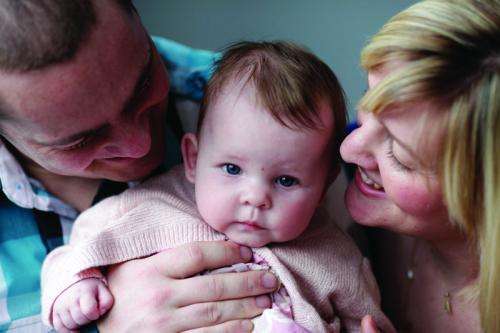Startle disease: Further key gene variants discovered

Research funded by children's charity Action Medical Research has uncovered new gene variants in startle disease, a rare condition in newborn babies. Understanding the genetic causes should lead to new genetic tests and is vital to ensure that babies get the correct treatment.
Around 60 per cent of cases remain unexplained, suggesting there are some genes for startle disease that have yet to be discovered1,2. Until recently, mutations in the GLRA1 gene were thought to be the only major cause.
Previously the same researchers discovered that newly found mutations in the GlyT2 gene3 are a second major cause of startle disease. The new results now also show that further mutations in the GLRB gene represent a third major cause of startle disease. In addition the researchers have found that certain mutations in the GLRB gene (W310C) may explain the 'minor' form of startle disease4. These results are reported in the journals Neurobiology of Disease and Human Molecular Genetics5.
The charity-funded study is a joint effort between Professor Robert Harvey of the UCL School of Pharmacy, London and Professor Mark Rees, Dr Seo-Kyung Chung and Dr Rhys Thomas at the Institute for Life Science, Swansea.
Babies with startle disease, also known as hyperekplexia, react in an exaggerated way when startled. They become rigid and unable to move, and sometimes stop breathing, which can prove fatal. Things that prompt the startle reaction include sudden, unexpected noise, movement and touch, and unexpected sight of people or objects.
Symptoms can continue throughout childhood and into adulthood, with some children experiencing severe breathing problems and others having learning difficulties.
The two-year study funded by Action Medical Research, ongoing until 28 February 2014, has so far allowed the research team to hunt down further elusive gene variants. Professor Robert Harvey says: "These new results have resolved many additional cases of startle disease and uncovered new disease mechanisms."
The results are important for better care and treatment and more accurate diagnosis tools, Professor Harvey explains: "We also found that certain genetic changes cause severe breathing problems during early infancy, learning difficulties and developmental delay. Training these babies' parents in resuscitation techniques and offering monitoring of heart rate and breathing could prove to be life-saving. And knowing the genetic causes of each child's illness enables us to predict more accurately what sort of educational needs they are likely to have in the future, which will help parents gain access to appropriate support services."
Professor Mark Rees adds: "After 20 years of collecting the clinical data and DNA from startle patients, it has been a journey of discovery which has seen the effective stratification of the clinical presentation and genes-of-effect in this paediatric neuromotor disorder. We feel this will have widespread impact in the care and wellbeing of startle disease patients.
More information: References:
1. Harvey RJ, Topf M, Harvey K, Rees MI (2008) The genetics of hyperekplexia: more than startle! Trends in Genetics 24: 439-447.
2. Thomas RH, Stephenson JBP, Harvey RJ, Rees MI (2010) Hyperekplexia: Stiffness, startle and syncope. Journal of Pediatric Neurology 8: 11-14.
3. Carta E, Chung SK, James VM, Robinson A et al (2012) Mutations in the GlyT2 gene (SLC6A5) are a second major cause of startle disease. J Biol Chem 287: 28975-28985.
4. James VM, Bode A, Chung SK, Gill JL et al (2013) Novel missense mutations in the glycine receptor β subunit gene (GLRB) in startle disease. Neurobiol Dis 52:137-149.
5. Chung SK, Bode A, Cushion TD, Thomas RH et al (2013) GLRB is the third major gene of effect in hyperekplexia. Hum Mol Genet 22:927-940.















